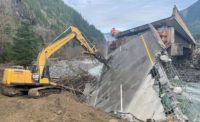Canadian construction and engineering companies are feeling the pinch as a multibillion-dollar federal infrastructure push runs up against mounting delays in getting new projects into the ground.
A report issued last month by a parliamentary budget watchdog is raising serious questions about how quickly the government will be able to make good on its promise of a $143.1-billion surge in spending over the next 12 years.
The federal government has pledged to spend $10.4 billion in the program’s 2016-18 first phase, which features relatively fast-tracked projects, such as renovations; however, so far, just $3 billion in potential projects have been identified, says Jean-Denis Fréchette, budget officer.
“A number of our members are unsettled they are not seeing more of that infrastructure spending coming this spring,” said Michael Atkinson, president of the Canadian Construction Association.
Yuri Lynk, Quebec-based director of equity research at Canaccord Genuity Corp., said provincial and municipal governments have long played the lead role in calling the shots on infrastructure projects. “The way [Canada’s] political system is set up, it’s usually very difficult for federal money to make its way into projects,” he said.
The federal government in July 2015 announced a $1.1-billion commitment to Calgary, Alberta’s new Green Line light-rail project, with plans to start construction in 2017. But city and provincial leaders officially earmarked their share of funding only in December, with work not set to start until 2018 or 2019.
Larger, more diversified firms such as SNC Lavalin, WSP Global, Stantec, Aecon Group and Stuart Olson with work in the U.S. and U.K can handle the schedule issues, says Lynk.
But delays have proven too much for Calgary-based Keystone Excavating, which hoped to win work on the transit project.
Already reeling from the oil-sector collapse, the firm now is closing operations after 35 years in the province, says CEO Sandip Lalli. “The forecast is too far away,” she says. “We shrunk our business to come through. You get hit again, and projects still haven’t tendered.”
National Bank Financial analyst Maxim Sytchev says infrastructure funds announced in 2015 by the Liberal government will “basically be a 2018 event for us.” It took 2½ years for the projects to get started after the Conservative Government announced its big infrastructure plan in 2006, he noted.
Brook Simpson, press secretary for the Minister of Infrastructure and Communities, noted the federal government owns just 2 percent of public infrastructure in Canada and so relies on provincial and municipal governments to “identify and submit projects.”
“We expect many more projects to be submitted and approved in the coming months as municipalities and provinces identify their priorities,” Simpson stated in an email.



Post a comment to this article
Report Abusive Comment